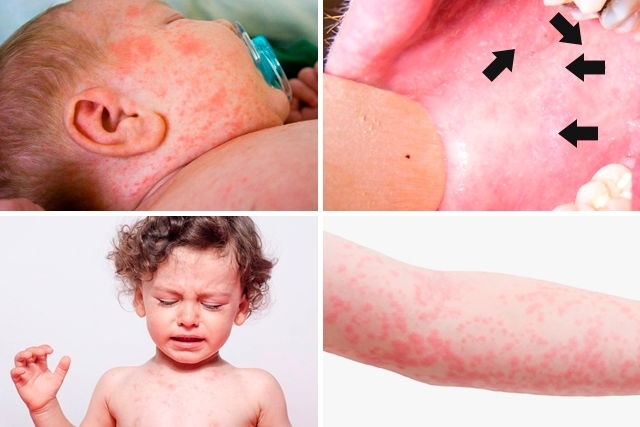Initial measles symptoms are similar to a cold or flu and emerge within 8 to 12 days of being with an infected person. It is common to notice a measles rash about 3 days after initial contact. This rash is usually not itchy but spreads throughout the entire body.
The main symptoms of measles are:
- Red rash on the skin that does not itch and spreads quickly throughout the body
- Sore throat
- Dry cough
- Muscular pain
- Excessive fatigue
- Fever over 38ºC (or 100.4ºF)
- White spots inside the mouth
- Red eyes
Measles is a viral infection that primarily affects children in their first year of life. However, measles can be caught by children over 1 year and by adults who have not been fully vaccinated. Cases are most commonly seen in the summer and fall.
Online symptoms quiz
If you think you or someone you know may be infected with measles, report the symptoms below:
What a measles rash looks like

Measles is caused by a virus in the Paramyxoviridae family. It is transmitted from person to person through droplets of saliva from an infected person, or through contact with an infected person’s fever. Vaccination is the best way to prevent this illness.
Learn what else can cause red spots on the skin and how to treat them.
Confirming a diagnosis
Measles diagnosis is confirmed by a pediatrician for children and a general physician in adults. The doctor with start by evaluating the presenting signs and symptoms. These may be similar to rubella, chickenpox, roseola or even a medication allergy. The doctor can confirm the measles virus by ordering lab tests, like blood work, a throat swab or a urine test.
If you suspect you may have measles, it is important to avoid contact with other people until you have been assessed. This virus is easily transmitted through coughing or sneezing, therefore you should use a mask until you have seen a doctor.
Possible complications
Measles complications are most seen in children less than 5 years old, and adults over 20 years old. Many of these patients experience pneumonia, diarrhea and an ear infection. Another complication of acute encephalitis, which emerges around the sixth day after the rash appears.
Treatment options
Treatment of measles consists of treating symptoms with rest, hydration, medications like acetaminophen, and a liquid or bland diet. Many patients are also advised to take vitamin A, as directed by their doctor.
Measles is most commonly seen in children, and treatment is aimed at managing symptoms like fever, general malaise, appetite loss and red rashes (which may erupt into small, ulcerated wounds).
